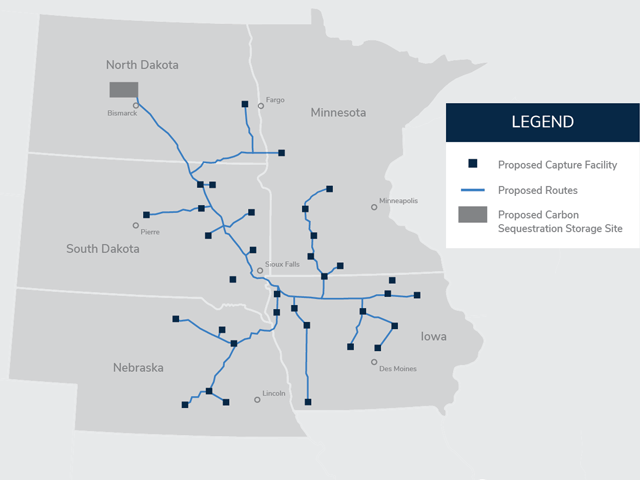Carbon Pipeline Project Update
Summit's Carbon Project Faces Setback After North Dakota Denies Permit
OMAHA (DTN) -- One of the companies seeking to build a carbon pipeline across five Midwest states is facing a setback after the North Dakota Public Service Commission on Friday unanimously denied a siting permit.
The Midwest Carbon Express CO2 Pipeline Project, led by Iowa-based Summit Carbon Solutions, was denied a permit for roughly 320 miles across North Dakota. The three-member Public Service Commission decision becomes a complicating factor for Summit because the pipeline plans to inject its carbon dioxide in an underground formation in North Dakota.
Summit has mapped out a 1,250-mile pipeline across five states -- Iowa, Minnesota, Nebraska, South Dakota and North Dakota -- that would extract and ship carbon dioxide emissions from more than 30 ethanol plants and sink the carbon into the ground.
Summit Carbon Solutions stated the company "respects the decision by the North Dakota Public Service Commission, and we will revisit our proposal and reapply for our permit. We're committed to understanding and incorporating the considerations outlined in the decision. We are confident that our project supports state policies designed to boost key economic sectors: agriculture, ethanol, and energy."
In a release about its decision, the North Dakota Public Service Commission (PSC) cited that the U.S. Geological Survey had noted 14 areas of potential geological instability within the project corridor.
P[L1] D[0x0] M[300x250] OOP[F] ADUNIT[] T[]
"Summit has not submitted information to the Commission demonstrating how it has addressed these concerns," the PSC stated.
Summit also had filed a letter on property appraisals that came after the PSC held its hearings on the pipeline project so the Commission and others did not have a chance to ask questions about the letter or question a witness from Summit, the PSC stated.
The North Dakota PSC noted it held four hearings last February. Opponents raised a broad range of concerns over eminent domain, safety, the permanence of carbon dioxide sequestration, impacts on tile drains and how the federal Pipeline and Hazardous Materials Safety Administration (PHMSA) is still working on its own set of standards for carbon pipelines. The PSC also noted topics such as eminent domain, federal safety compliance and carbon storage "were outside the jurisdiction and consideration of the Commission."
Summit had stated back in March that the company had secured voluntary easements from more than 375 North Dakota landowners, accounting for 70% of the proposed pipeline route in the state. Summit stated the company plans to invest nearly $900 million in North Dakota as part of the project.
Critics of the pipeline praised the PSC decision on Friday, pointing out the Summit pipeline now has no injection point.
"It has been a long and painful journey for North Dakota landowners concerned about a foreign-owned company forcing itself upon them and targeting landowners' property for private profits, funded by the American taxpayer," said Brian Jorde, lead attorney for landowners with Domina Law Group. "We applaud the Public Service Commission for their courage and thoughtfulness in denying Summit's application and encourage the other states to follow suit."
The pipeline has strong support from more than 30 ethanol plants across the five states that want to connect to it as a way to draw down their carbon intensity scores. The Iowa Renewable Fuels Association earlier this year cited the value to ethanol plants to take advantage of tax credits in the Inflation Reduction Act meant to lower carbon emissions. The Clean Fuels Production Credit, or 45Z credit, could generate 48 cents a gallon for ethanol plants that sequester carbon.
The North Dakota decision comes as the Iowa Utilities Board will hold its hearings on the Summit pipeline set to start Aug. 22 in Fort Dodge, Iowa. Opponents of the pipeline in Iowa are expected to attend those hearings in force to halt the project in that state as well.
Separately, the South Dakota Public Utilities Commission (PUC) has spent the past week holding hearings on the Navigator Heartland Greenway pipeline, a 1,300-mile pipeline that would tie into ethanol plants in eastern South Dakota, but then run through Iowa and sink its carbon into an Illinois formation. The South Dakota Searchlight reports many of the same issues are being raised in that series of hearings. The Searchlight report the PUC is expected to decide on the Navigator permit by Sept. 26. South Dakota will hold its hearings on Summit's pipeline Sept. 11-22.
Chris Clayton can be reached at Chris.Clayton@dtn.com
Follow him on X, the social media site formerly known Twitter, @ChrisClaytonDTN
(c) Copyright 2023 DTN, LLC. All rights reserved.




